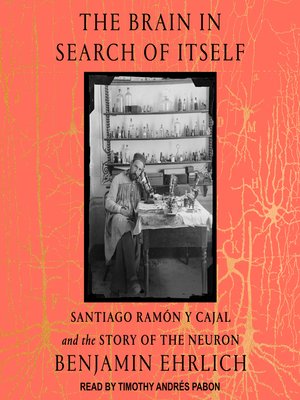The Brain in Search of Itself
audiobook (Unabridged) ∣ Santiago Ramón y Cajal and the Story of the Neuron
By Benjamin Ehrlich

Sign up to save your library
With an OverDrive account, you can save your favorite libraries for at-a-glance information about availability. Find out more about OverDrive accounts.
Find this title in Libby, the library reading app by OverDrive.



Search for a digital library with this title
Title found at these libraries:
| Library Name | Distance |
|---|---|
| Loading... |
Unless you're a neuroscientist, Santiago Ramón y Cajal is likely the most important figure in the history of biology you've never heard of. Along with Darwin and Pasteur, he ranks among the most brilliant and original biologists of the nineteenth century, and his discoveries have done for our understanding of the human brain what the work of Galileo and Sir Isaac Newton did for our conception of the physical universe.
Benjamin Ehrlich's The Brain in Search of Itself is the first major biography in English of this figure, whose scientific odyssey mirrored the rocky journey of his beloved homeland of Spain into the twentieth century. A portrait of a nation as well a biography, The Brain in Search of Itself follows Cajal from the hinterlands to Barcelona and Madrid, where he became an illustrious figure. Cajal devised a theory that was as controversial in his time as it is universal in ours: that the nervous system is comprised of individual cells with distinctive roles.
In our age of neuro-imaging and investigations into the neural basis of the mind, Cajal is the artistic and scientific forefather we must get to know. The Brain in Search of Itself is at once the story of how the brain as we know it came into being and a finely wrought portrait of an individual as fantastical and complex as the subject to which he devoted his life.
Benjamin Ehrlich's The Brain in Search of Itself is the first major biography in English of this figure, whose scientific odyssey mirrored the rocky journey of his beloved homeland of Spain into the twentieth century. A portrait of a nation as well a biography, The Brain in Search of Itself follows Cajal from the hinterlands to Barcelona and Madrid, where he became an illustrious figure. Cajal devised a theory that was as controversial in his time as it is universal in ours: that the nervous system is comprised of individual cells with distinctive roles.
In our age of neuro-imaging and investigations into the neural basis of the mind, Cajal is the artistic and scientific forefather we must get to know. The Brain in Search of Itself is at once the story of how the brain as we know it came into being and a finely wrought portrait of an individual as fantastical and complex as the subject to which he devoted his life.







